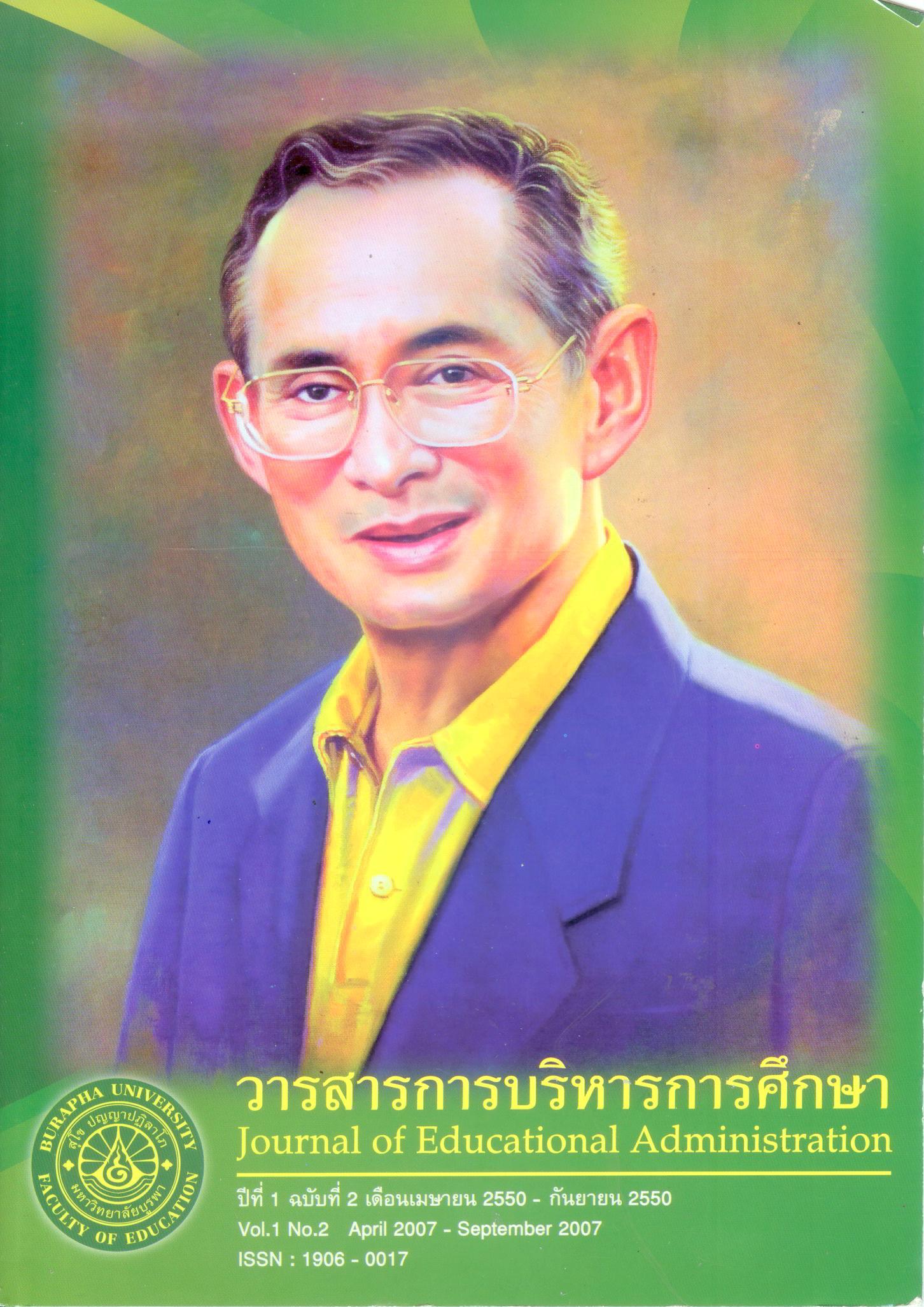รูปแบบการพัฒนาภาวะผู้นำเหนือผู้นำของผู้บริหารโรงเรียน อาชีวศึกษาเอกชน (SUPERLEADERSHIP DEVELOPMENT MODEL FOR THE PRIVATE VOCATIONAL SCHOOL ADMINISTRATORS)
Abstract
บทคัดย่อ
การวิจัยครั้งนี้มีวัตถุประสงค์เพื่อพัฒนารูปแบบภาวะผู้นำเหนือผู้นำสำหรับผู้บริหารโรงเรียนอาชีวศึกษาเอกชน และหาประสิทธิภาพของรูปแบบภาวะผู้นำเหนือผู้นำสำหรับผู้บริหารโรงเรียนอาชีวศึกษาเอกชน โดยกำหนดระเบียบวิธีวิจัย 6 ขั้นตอน คือ 1) การทบทวนวรรณกรรม 2) การสร้างแบบสอบถามการพัฒนาภาวะผู้นำเหนือผู้นำของผู้บริหารโรงเรียนอาชีวศึกษาเอกชน โดยผู้ทรงคุณวุฒิ 5 คน ตรวจสอบความเที่ยงตรง 3) การพัฒนารูปแบบภาวะผู้นำเหนือผู้นำสำหรับผู้บริหารโรงเรียนอาชีวศึกษาเอกชน โดยสอบถามผู้เชี่ยวชาญ 19 คน ด้วยกระบวนการเทคนิคเดลฟาย 4) การตรวจสอบความเป็นไปได้ และความเหมาะสมของรูปแบบการพัฒนาภาวะผู้นำเหนือผู้นำของผู้บริหารโรงเรียนอาชีวศึกษาเอกชน โดยผู้ทรงคุณวุฒิ 10 คน ด้วยการสนทนากลุ่ม 5) การพัฒนาคู่มือกระบวนการฝึกอบรมภาวะผู้นำเหนือผู้นำ และ 6) การทดลองใช้ในโรงเรียนอาชีวศึกษาเอกชน 1 แห่งเพื่อประเมินประสิทธิภาพของรูปแบบการพัฒนาภาวะผู้นำเหนือผู้นำของผู้บริหารโรงเรียนอาชีวศึกษาเอกชน สถิติที่ใช้ในการวิเคราะห์ข้อมูล ได้แก่ ค่าร้อยละ ค่าเฉลี่ย ส่วนเบี่ยงเบนมาตรฐานค่ามัธยฐานค่าพิสัยระหว่างควอไทล์ และการทดสอบค่าที
ผลการวิจัยพบว่า รูปแบบการพัฒนาภาวะผู้นำเหนือผู้นำของผู้บริหารโรงเรียนอาชีวศึกษาเอกชน ประกอบด้วย 7 ด้านเรียงลำดับตามค่าเฉลี่ยจากมากไปน้อย คือ 1) ด้านสนับสนุนให้เกิดผู้นำตนเองโดยการสร้างทีมงาน 2) ด้านการทำให้เป็นผู้นำตนเอง 3) ด้านอำนวยความสะดวกให้เกิดวัฒนธรรมของผู้นำตนเอง 4) ด้านกระตุ้นให้ผู้ตามตั้งเป้าหมายด้วยตนเอง 5) ด้านผู้นำแสดงเป็นแบบฉบับที่เป็นผู้นำตนเอง 6) ด้านอำนวยความสะดวกให้เกิดภาวะผู้นำตนเองโดยการให้รางวัลและตำหนิอย่างสร้างสรรค์ และ 7) ด้านสร้างรูปแบบความคิดทางบวก ผลการประเมินประสิทธิภาพของรูปแบบโดยนำไปใช้ทดลองในโรงเรียนอาชีวศึกษาเอกชน พบว่า ผู้เข้าอบรมหลังการทดลองใช้รูปแบบการพัฒนาภาวะผู้นำเหนือผู้นำมีภาวะผู้นำสูงกว่าก่อนการทดลองอย่างมีนัยสำคัญทางสถิติที่ระดับ .05 แสดงว่ารูปแบบภาวะผู้นำเหนือผู้นำมีประสิทธิภาพ
Abstract
The purposes of this research were to develop the model and to evaluate effectiveness of superleadership development model for the private vocational school administrators. The research procedures consisted of six steps as follows: 1) Review of literature; 2) Design a model for superleadership development validated by five experts; 3) Develop a superleadership model by using Delphi Technique participated by 19 experts; 4) Verity possibility and appropriateness of a superleadership model by using focused group process participated by 10 experts; 5) Develop a training process manual of superleadership and 6) Implement superleadership model in Rayong Commercial School and evaluate the effectiveness of superleadership development model. The statistical devices for data analysis were percentage, mean, standard deviation, median, interquartile range, and a t-test.
The results of the study revealed that the model of superleadership development for the private vocational school administrators listed by prioritization were 1) promoting self-leadership through teamwork 2) becoming self-leaders; 3) facilitating self-leadership culture; 4) stimulating self-set goals, 5) presenting a model self-leadership; 6) facilitating self-leadership though reward and constructive reprimand; and 7) creating positive thought patterns, The effectiveness of superleadership model was found of being significant different at the .05 level and the mean
score of the post-test was of being higher than the pre-test score.


